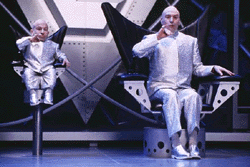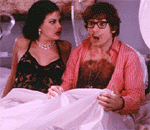
 |
| Don't Shave It...Stripe It! |
| Top Ten Torture Tips |
| Sheremetyevo's Negro Tax |
 |
 |
 |
![]()
Don't get me wrong--I'm not saying Austin Powers: The Spy Who Shagged Me is a 100% bad movie. For instance, thanks to a retarded cab driver I missed the opening scene and credits, where, as I understand it, Elizabeth Hurley is revealed to actually be a Fembot in the employ of Dr. Evil and then killed, or dismantled, or whatever it is one does to evil robots who look like Liz Hurley. This scene might have been entertaining.
Mini-Me, the recently created and very ill-tempered 1/8th-size clone of Dr. Evil, is a truly winning character. The same can be said of Fat Bastard, the hideously overweight (and rather deluded) disgruntled Scot who is for some reason employed by the Ministry of Defense and is subsequently hired as a spy by Dr. Evil to steal Austin Powers's "mojo." (On that note, I just want to ask
 |
The scene early on where Dr. Evil surprises his son, Scott, on The Jerry Springer Show ("My Father Is Evil and Wants to Take over the World") is also pretty good. With the good doctor cavorting around on stage with Springer and some KKK parents and plenty of family secrets laid bare, it's roughly the equivalent of the Carrie Fisher group in the original movie. Except in this case the scene goes on and on, essentially repeating the same joke over and over, until the audience (and even Dr. Evil himself) is fatigued and irritable, looking like they'd much prefer to go home and sew nametags into their laundry. And then it's all downhill from there.
In fact, the entire sequel plays much like an elaborate excuse for the fact that not much effort and exactly zero originality was put into the new movie, presumably because everyone involved knew beforehand that it would be a mega-hit no matter what they put on the screen. This translates into the quasi-ironic replaying of various anti-jokes from the first film, such as the nearly dead Mustapha or the series of bad puns unleashed following the mutilation and murder of a henchman. The scene where Dr. Evil shushes Scott is even repeated twice. These jokes were amusing the first time around solely by virtue of the fact that they were intentionally unfunny and, even more importantly, the timing. And the timing in this sequel is lousy.
So lousy, in fact, that most of the rare sparks of inventiveness are squandered in the execution. Take Dr. Evil's plot to blow up Washington and other major world cities--named after a scientist called Alan Parsons, it is of course known as the "Alan Parsons Project." An amusingly enough little gag, it would seem. Except the timing of the delivery is completely botched. Then, to make matters worse, the actual source of the name is explicated by son Scott in the pedantic, redundant way he has of glossing just about every pop cultural reference in the movie. I don't know whether this was to help the audience get the jokes or whether his M.O. was intended as another of those intentionally unfunny jokes, but I found it to be flat out annoying. You would be wise to do the same.
Then there are the inevitable problems that come in to play when you've got a major movie with major studio expectations, of which of the original film was almost completely free. In this respect, is it any less damaging to have product placements for Starbucks et al if you're able to make something of a joke out of the product placement itself? Well no, actually. First of all, the
 |
Another, kind of random, question: Is it clever or just plain lazy when the characters joke to the audience about the time-travel depicted in the film being completely illogical? Actually, I'm not completely sure on this one. You figure it out for yourself.
And can we talk honestly about Heather Graham for just a second? Just because an actress has been cast in the "hot chick" role, does not necessarily make that actress a "babe" (more of those scare quotes--ya just got to love it). She does have nice tits, I'll grant you that. But look at her face, really: it's distasteful, typically American, about fifteen minutes from disintegrating into a sea of wrinkles. Her legs almost look all right, except if you look real close you see that there's a scaliness to her skin down there, not to mention a certain dangling turkey flesh aspect to the meat on the back of her thighs. More importantly, of course, she cannot act to save her life. He dialogue did not irritate me so much as it just bummed me out. That's basically how I feel about the whole damn movie, and I'd rather not talk about it anymore if that's OK.
Now, The General's Daughter, directed by Con-Air's Simon West and starring the ever-shrill Madeleine Stowe and the apparently now eternally puffy-headed John Travolta, is a much simpler story.
It purports to go "behind the lies," the lies and corruption in the U.S.
 |
For the sake of you eternal optimists out there, James Woods has a pretty good over-the-top time being well-tanned and bisexual. However, this error is soon realized and his suicide (to the tune of Carmina Burana) is faked by some unknown character or film crew member pretty early on.
I gather this was supposed to play something like Philip Marlowe as a military PI in Georgia. Instead it seems like the kind of movie Woody Harrelson should be in. Furthermore, it is the kind of movie John Travolta appears in, so there.


